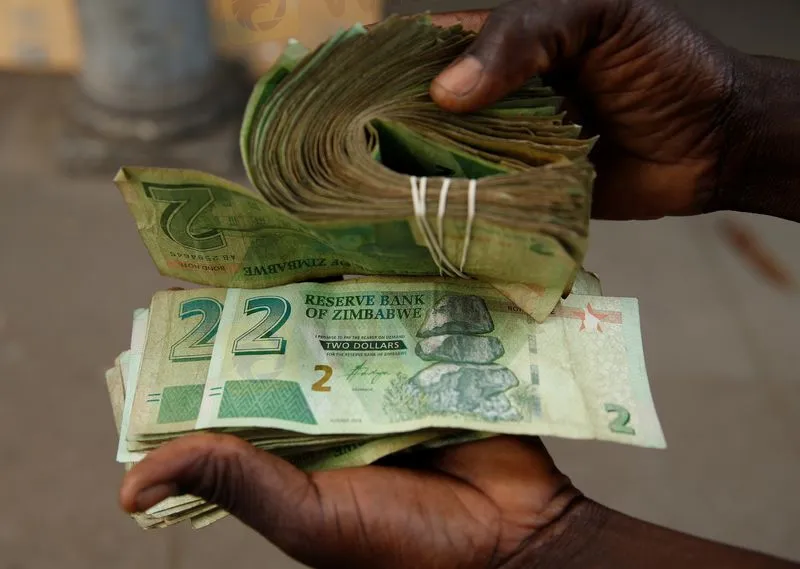简体中文
繁體中文
English
Pусский
日本語
ภาษาไทย
Tiếng Việt
Bahasa Indonesia
Español
हिन्दी
Filippiiniläinen
Français
Deutsch
Português
Türkçe
한국어
العربية
Zimbabwe suspends bank lending in bid to arrest currency decline
Abstract:The devaluation of theZimbabwedollar's black market exchange rate, which is used in most financial transactions in the economy, has been driving up inflation.

Zimbabwe's government on Saturday ordered banks to stop lending with immediate effect in a move Harare said was designed to stop speculation against the Zimbabwean dollar and was part of a raft of measures to arrest its rapid devaluation on the black market.
The southern African country reintroduced a local currency in 2019 after abandoning it in 2009 when it was hit by hyperinflation.
However, the Zimbabwean dollar, which is officially quoted at 165.94 against the U.S. dollar, has continued to slide on the black market, where it is trading between 330 and 400 to the greenback.
The black market exchange rate has moved from about 200Zimbabwedollars at the beginning of the year.
President Emmerson Mnangagwa on Saturday announced measures he said were meant to arrest the currency's depreciation, which he said threatenedZimbabwe's economic stability.
“Lending by banks to both the government and the private sector is hereby suspended with immediate effect, until further notice,” Mnangagwa said in a statement.
He accused unnamed speculators of borrowingZimbabwedollars at below-inflation interest rates and using the money to trade in forex.
Other measures include an increased tax on forex bank transfers, higher levies on forex cash withdrawals above $1,000, and the payment of taxes which used to be charged in forex in local currency.
The devaluation of theZimbabwedollar's black market exchange rate, which is used in most financial transactions in the economy, has been driving up inflation.
Year-on-year inflation quickened to 96.4% in April, from 60.6% in January.
For more Forex news, please download WikiFX- the Global Broker Regulatory Inquiry APP.
Disclaimer:
The views in this article only represent the author's personal views, and do not constitute investment advice on this platform. This platform does not guarantee the accuracy, completeness and timeliness of the information in the article, and will not be liable for any loss caused by the use of or reliance on the information in the article.
Read more

Why Is UK Inflation Rising Again Despite Recent Lows?
October inflation rises to 2.3%, driven by energy costs. Renters face 8% annual hikes, while house price inflation climbs. Interest rates stay elevated.

How Inflation Rates Affect Forex Prices Globally
In this article, we’ll explore how inflation affects forex prices globally, the relationship between inflation and currency value, and why traders monitor inflation closely.

PH Financial Sector Grows to P32.3T, Up 10.5% in June
The Philippine financial sector expanded by 10.5% in June, reaching P32.3 trillion. Bank resources surged, while positive earnings drove stock market gains.

US Inflation Cools, But Economic Pressures Still Remain
Inflation shows signs of cooling in the U.S., but persistent economic pressures, particularly housing and utilities, continue to challenge growth.
WikiFX Broker
Latest News
Justin Sun Invests $30M in Trump-Backed World Liberty Financial
Kraken Closes NFT Marketplace Amid New Product Focus
Robinhood Launches Ethereum Staking with 100% Rewards Match
Broker Review: Is FOREX.com a solid Broker?
Philippine Banks Launch PHPX Stablecoin to Transform Payments
Elon Musk Warns of Imminent US Bankruptcy | Bitcoin Retreats from $100K
WikiEXPO Global Expert Interview: Advanced Practices and Insights in Financial Regulation
Pros & Cons of Automated Forex Trading
Magic Compass Sponsors World Taekwondo Poomsae Championships 2024
Trump tariffs: President-elect is serious but it\s not about trade
Currency Calculator


